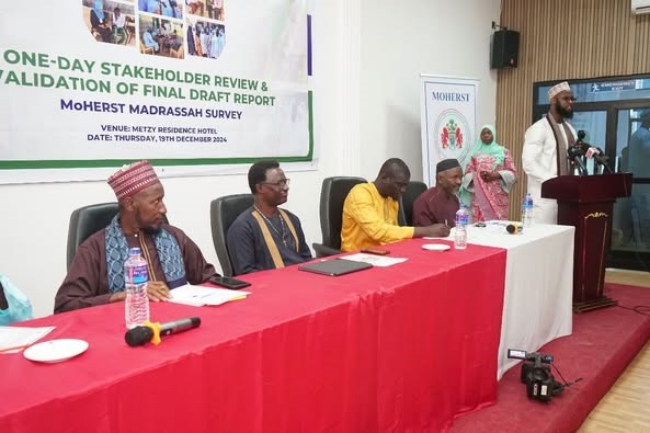Gambiaj.com – (BANJUL, The Gambia) – A consultancy report on Madrassah education in The Gambia has revealed critical challenges facing grade 12 school leavers, sparking urgent calls for reform. The report, reviewed during a stakeholder validation session highlighted limited English proficiency, a lack of technical and vocational education and training (TVET) opportunities, and the absence of clear pathways to higher education or professional careers as major barriers for Madrassah students.
Organized by the Ministry of Higher Education, Research, Science, and Technology (MoHERST) in partnership with the World Bank through the RISE Project, the session gathered key stakeholders, including government officials, Islamic university leaders, Madrassah principals, and development partners.
Madrassah, traditionally known in The Gambia as institutions for Islamic education conducted in Arabic, face challenges related to limited career options for graduates. These include a lack of skills in critical areas such as science, technology, engineering, and mathematics (STEM).
Professor Pierre Gomez, the Minister of Higher Education, emphasized the government’s commitment to addressing these gaps through an inclusive and integrated education system.
Madrassah have historically been a pathway for students to become Quranic teachers or imams. However, the integration of Madrassah education with the general curriculum now allows students to acquire STEM-related skills, enabling them to enter professions such as engineering, medicine, and civil services.
Delivering the keynote address, Prof. Pierre Gomez, Minister of MoHERST, underscored the importance of the findings, calling the integration of Madrassah education into the broader post-secondary education system “a moral duty and a national obligation.” He emphasized the need for robust reforms to address the gaps identified in the report, particularly by incorporating TVET and STEM into the Madrassah curriculum.
“The integration of Madrassah education into our post-secondary education system, with a strong emphasis on TVET and STEM, is not merely a policy directive—it is a moral duty and a national obligation,” Prof. Gomez stated.
The report also recommended improving English language skills and developing structured career pathways to better prepare Madrassah graduates for both academic and professional success.
Imam Baba Leigh highlighted the potential of Madrassah students, citing his own experience as an example of successfully balancing Islamic and conventional education.
“We want Madrassah to produce engineers, doctors, and other professionals,” Imam Leigh said. “There are many intelligent individuals in the madrasas. Once they master the Quran, no subject is too difficult for them.”
To facilitate this transformation, the government has introduced a unified curriculum for all educational institutions, including Madrassah. The curriculum includes core subjects like mathematics, languages, history, geography, and life skills alongside Islamic studies. MOHERST has also launched scholarship programs to support Madrassah students in furthering their education.
Presidential Advisor Momodou Sabally underscored the importance of providing equal opportunities for Madrassah students. “The Arab Islamic students, the Madrassah students, do not pay less tax than those in conventional education. Those taxes should fund equal opportunities for everyone,” Sabally remarked, emphasizing that a different language of instruction does not imply a lack of capability.
With Madrasas and Majalis accounting for over 19% of The Gambia’s school population, the proposed reforms are expected to bridge critical gaps and strengthen the role of Madrassah in shaping the nation’s moral, academic, and professional landscape.










